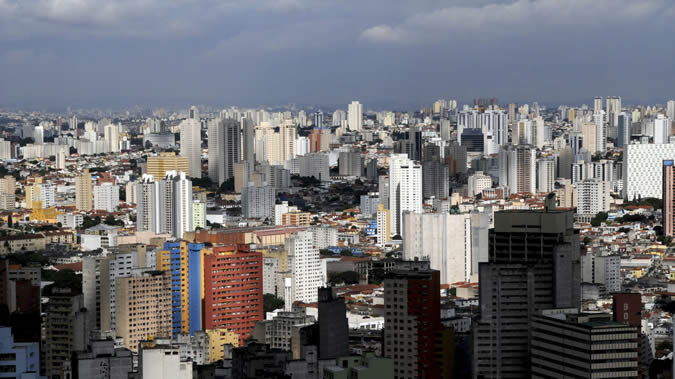Colloquiums Begin to Define a New Metropolitan Urban Agenda in the Region
Work area(s)
Topic(s)
Latin America’s 40 most important cities generate 30% of GDP, making this developing region the most urbanized in the world.

Latin America is the most urbanized developing region in the world and this process has resulted in improved economic and social indicators but it also necessitates the implementation of a new metropolitan urban agenda that strives for greater equality and sustainability, senior officials from international organizations and countries in the region agreed during a colloquium that began today at the headquarters of the Economic Commission for Latin America and the Caribbean (ECLAC).
The First South American Colloquium on Metropolitan Cities was inaugurated by ECLAC’s Deputy Executive Secretary, Antonio Prado; São Paulo’s Deputy Mayor, Nádia Campeão; the Planning Director at the Municipality of Santiago, Chile, Gabriela Elgueta; the Executive Vice President of the Chilean Economic Development Agency (CORFO), Eduardo Bitrán; the President of São Paulo’s City Council, Antonio Donato; and Paula Ravanelli, advisor to the Brazilian Presidency’s Under-Secretariat of Federal Affairs.
It is calculated that 80% of Latin America’s population lives in cities and, according to figures from the United Nations Human Settlements Program (UN-Habitat), the 40 main urban centers in the region generate 30% of overall Gross Domestic Product (GDP). “Development indicators have benefited from the process of urbanization. Metropolises mobilize human and technological resources in a more efficient way, producing advantages in terms of competitiveness and innovation,” ECLAC’s Deputy Executive Secretary said.
Currently the region’s cities are facing challenges in terms of transportation, solid waste management, atmospheric pollution and availability of green spaces, among other issues. “We have many similarities and shared challenges, but we do not always share our analyses and solutions,” said the Deputy Mayor of São Paulo, the municipality that is co-organizing these colloquiums along with ECLAC.
This first meeting, dedicated to urban ecosystems and sustainability, will continue through Tuesday, April 28. The initiative, called MSUR, contemplates three more colloquiums: one in June in São Paulo, on urban development and socio-spatial inequalities; a second in August in Quito, about the urban economy; and a third in September in Montevideo, about government and governance, citizenship, education and culture.
The recommendations agreed upon during this process will be presented in numerous forums and will serve to articulate a regional stance ahead of the United Nations Conference on Housing and Sustainable Urban Development, Habitat III, which will be held in Quito in October 2016 with the aim of forging a new national urban agenda. This will take place twenty years after a conference held in Istanbul, where the Habitat Agenda was established with the goal of promoting the sustainable development of human settlements in a world undergoing urbanization.
UN-Habitat has solicited that regional United Nations commissions prepare reports about this issue that include the perspective of each region. ECLAC will carry out this process in a participatory way, along with representatives of States, academic institutions and civil society and in conjunction with the regional offices of UN-Habitat.
During this first colloquium, Gabriela Elgueta, the Planning Director from the Municipality of Santiago, explained the work undertaken by that body to create new public spaces, discourage the use of automobiles and recover the cultural legacy of that district, one of the 32 wards that make up the Chilean capital. CORFO’s Executive Vice President, Eduardo Bitrán, spoke of the program led by this state agency to develop creative and smart cities.
Meanwhile, Antonio Donato of São Paulo’s City Council and Paula Ravanelli, from Brazil’s Office of the Presidency, underscored the role of local and national governments in development processes and their participation in the design of a new urban agenda.
Related content
Inauguración del Primer Coloquio Sudamericano sobre Ciudades Metropolitanas (MSUR)
Intervención de Antonio Prado, Secretario Ejecutivo Adjunto de la CEPAL.
Related link(s)
Country(ies)
- South America
-
Mexico
Contact
Public Information Unit
- prensa@cepal.org
- (56 2) 2210 2040